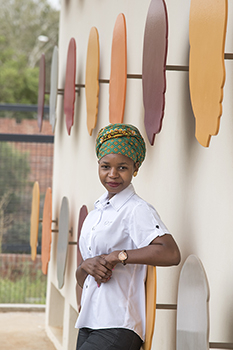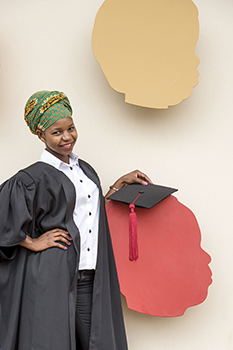Latest News Archive
Please select Category, Year, and then Month to display items
06 April 2018
Photo Rulanzen Martin
 From the left: Dr Thulisile Mphambukeli, leader of the BRICS research team that is exploring the political economy of water and food security, and her research partner, Dr Victor Okorie.
From the left: Dr Thulisile Mphambukeli, leader of the BRICS research team that is exploring the political economy of water and food security, and her research partner, Dr Victor Okorie.
A Brazil, Russia, India, China and South Africa (BRICS) delegation is to hold the 10th Annual BRICS Summit in the last week of May 2018 in Johannesburg. Dr Thulisile Mphambukeli, leader of the University of the Free State (UFS) research team alongside Dr Victor Okorie from the Department of Urban and Regional Planning, in collaboration with Prof Lere Amusan of North-West University, will ensure that water and food security is a prominent feature on the gathering’s agenda.
First, the project titled: “Exploring the political economy of water and food security nexus in BRICS and Africa” will debut at the National Institute for the Humanities and Social Sciences BRICS Think Tank Forum”.
According to Dr Mphambukeli, the key to water security is attitudinal change by means of education and conscientisation. This, she is adamant about, holds the potential to drive behavioural adjustments in the way society interacts with water.
Genetic and social approaches
Dr Okorie asserts that if strides towards reducing the demand for water were to be made, research efforts should be geared towards effecting changes at DNA level. Meaning we need to explore waterwise ways that enable crops and animals to thrive optimally.
The project also looks at social dimensions of water such as flushing a toilet. “Research activities on redesigning toilets, especially the urinal, where more than nine litres of water are used to flush less than one cubic centimetre of urine, are timely in the context of managing water and the food nexus crises,” said Dr Okorie.
Combining the genetic and social approaches would allow us to produce more with a smaller water footprint. This can be made possible by implementing precision agriculture which is about estimating and applying exact quantities of water and nutrients needed for the production of crops or the raising of livestock.
Paradigm shifting policies
Prof Amusan said the team intended to propose functional solutions that take the quality of water into consideration. Equitable production and distribution of water depends on endorsing policies of co-production between citizens, governments and the public sector. BRICS member states mutually consider water and food security as an issue of paramount significance, hence its feature on this prestigious summit’s agenda.
It takes a village to raise a child
2016-06-13

Valentino Ndaba
Photo: Sonia Small
(Click on CC for subtitles)
Video
Student Bursary Fund Campaign booklet (pdf)
Donate
Student Bursary Fund Campaign launched: #FundAFuture and make a difference
Motho ke motho ka batho. A person is a person through others
Want to make a difference in the world? Here is how
South Africa has one of the most spectacular coastlines in the world. Take the ribbon of golden beaches sweeping along the shores of KwaZulu-Natal, for instance. But just beyond the kiteboards dappling the ocean and fields of swaying sugarcane lies one of the largest informal settlements in the province: Amaoti. A place where barefoot children are skipping alongside poverty, and violent crime incinerates hope.
Nonetheless, that place could not keep Valentino Ndaba from graduating at the University of the Free State (UFS), and setting her sails for post-graduate studies.
A village
It takes a village to raise a child. This African proverb ripples across Valentino’s life story. “My gran always used to say education is your eternal bread. She still says it to this day. She has always instilled in me the importance of education,” Valentino smiles. Her grandmother has been but one of several champions in Valentino’s life.
Maalthee Dayaram – a teacher at Brookdale Secondary School that Valentino attended – noticed a budding talent in the young girl’s writing. With dedicated attention and ceaseless encouragement, Mrs Dayaram helped pave the way for this young writer. “You might be talented and have potential, but having someone actually believe in you and tell you that you have potential makes such a difference,” Valentino says. “I fell in love with writing, and had an idea that writing might be my future.” Dire economic circumstances threatened to snuff out any sparks of hope from that fragile future, though.
Aided by Lungisani Indlela (a non-profit organisation that provides children in the Amaoti area with school fees, uniforms, shoes, etc), Valentino clung to faith in the power of education. With unwavering single-mindedness, she consistently earned top grades.

Photo: Sonia Small
Not if, but when
“Dreaming of my future, my gran would always say to me, ‘when you go to university’ or ‘when you have graduated’, this and that will follow.” Her gran’s words proved to be prophetic. As the final matric results were published in early January 2012, Valentino received a phone call that would change her life irrevocably.
That call came from the well-known South African humanitarian, Tich Smith. “Would you be willing to go to university in another province?” Smith asked. Never having travelled beyond her immediate surroundings, Valentino’s brave answer was: “Yes.”
A few days later, she walked onto the Bloemfontein Campus of the UFS.
Changing futures
Valentino proceeded to obtain a BA degree in Media Studies and Journalism in 2014. She has now set her sights on an honours degree, and envisions pursuing a Master’s degree in creative writing overseas.
“Without the support I received, I would have been stuck without a future,” she says. “University has shaped me into a better version of myself. I’ve grown intellectually, spiritually, and emotionally.”
You can bring about the same change for other students in need. By contributing to the UFS Student Bursary Fund Campaign, you can change the future not only of individuals, but of communities and of our country as well.
The impact of your financial support reaches far beyond its monetary value. It pulls families from poverty. It sends forth experts and visionaries into the world. It sets in motion a culture of giving.
Visit our Giving page for ways to contribute.